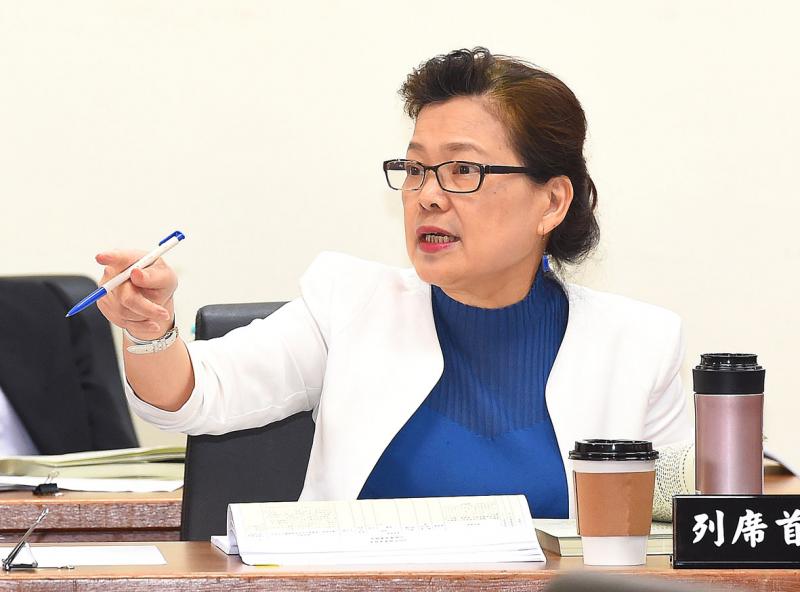ShopeePay Taiwan Co’s (蝦皮支付) proposed e-payment service would “come under further scrutiny” over possible Chinese capital, Minister of Economic Affairs Wang Mei-hua (王美花) said yesterday.
The Investment Commission would re-evaluate ShopeePay’s status as a non-Chinese foreign company when its parent company, Singapore-based SeaMoney (Payment) TW Private Ltd, injects further capital, Wang told a meeting of the legislature’s Economics Committee in Taipei.
The Financial Supervisory Commission (FSC) on Tuesday approved ShopeePay’s application to operate an electronic payment service in Taiwan.

Photo: Liao Chen-huei, Taipei Times
ShopeePay must apply for an operating license within six months.
However, ShopeePay has capitalization of NT$5 million (US$173,503), NT$495 million shy of the requirements to become an e-payment service in Taiwan, which means more capital is to be injected.
Although ShopeePay is deemed a non-Chinese foreign company, Chinese technology giant Tencent Holdings Ltd (騰訊) is a major shareholder of SeaMoney’s parent company, Sea Ltd.
Tougher rules over Chinese capital announced by the Investment Commission in August would apply in the ShopeePay case, Wang said.
Amendments to the Measures Governing Investment Permits to the People of the Mainland Area (大陸地區人民來台投資許可辦法) are to take effect this year or early next year, Investment Commission spokesman Su Chi-yen (蘇琪彥) told the Taipei Times by telephone.
“It is easy for ShopeePay to be deemed a non-Chinese foreign-owned company with capital of just NT$5 million, but it has to show the provenance of the other NT$495 million,” Su said.
He said that the “sensitive nature” of e-payments would draw further scrutiny over possible Chinese capital.
“It would basically be a financial firm at that point,” he said. “Chinese-held companies are not permitted to operate in that category.”
The Investment Commission considers any company that is more than 30 percent controlled by Chinese capital to be a Chinese company, Su said.
ShopeePay operates as a third-party payment service provider, servicing its e-commerce affiliate, Shopee Taiwan Co (樂購蝦皮).
However, as ShopeePay’s transactions exceed NT$1 billion per day, it must apply to be listed as an e-payment company, which are subject to tighter regulations, the FSC said on Tuesday.

Shares in Taiwan closed at a new high yesterday, the first trading day of the new year, as contract chipmaker Taiwan Semiconductor Manufacturing Co (TSMC, 台積電) continued to break records amid an artificial intelligence (AI) boom, dealers said. The TAIEX closed up 386.21 points, or 1.33 percent, at 29,349.81, with turnover totaling NT$648.844 billion (US$20.65 billion). “Judging from a stronger Taiwan dollar against the US dollar, I think foreign institutional investors returned from the holidays and brought funds into the local market,” Concord Securities Co (康和證券) analyst Kerry Huang (黃志祺) said. “Foreign investors just rebuilt their positions with TSMC as their top target,

REVENUE PERFORMANCE: Cloud and network products, and electronic components saw strong increases, while smart consumer electronics and computing products fell Hon Hai Precision Industry Co (鴻海精密) yesterday posted 26.51 percent quarterly growth in revenue for last quarter to NT$2.6 trillion (US$82.44 billion), the strongest on record for the period and above expectations, but the company forecast a slight revenue dip this quarter due to seasonal factors. On an annual basis, revenue last quarter grew 22.07 percent, the company said. Analysts on average estimated about NT$2.4 trillion increase. Hon Hai, which assembles servers for Nvidia Corp and iPhones for Apple Inc, is expanding its capacity in the US, adding artificial intelligence (AI) server production in Wisconsin and Texas, where it operates established campuses. This

H200 CHIPS: A source said that Nvidia has asked the Taiwanese company to begin production of additional chips and work is expected to start in the second quarter Nvidia Corp is scrambling to meet demand for its H200 artificial intelligence (AI) chips from Chinese technology companies and has approached contract manufacturer Taiwan Semiconductor Manufacturing Co (TSMC, 台積電) to ramp up production, sources said. Chinese technology companies have placed orders for more than 2 million H200 chips for this year, while Nvidia holds just 700,000 units in stock, two of the people said. The exact additional volume Nvidia intends to order from TSMC remains unclear, they said. A third source said that Nvidia has asked TSMC to begin production of the additional chips and work is expected to start in the second

US President Donald Trump on Friday blocked US photonics firm HieFo Corp’s US$3 million acquisition of assets in New Jersey-based aerospace and defense specialist Emcore Corp, citing national security and China-related concerns. In an order released by the White House, Trump said HieFo was “controlled by a citizen of the People’s Republic of China” and that its 2024 acquisition of Emcore’s businesses led the US president to believe that it might “take action that threatens to impair the national security of the United States.” The order did not name the person or detail Trump’s concerns. “The Transaction is hereby prohibited,”